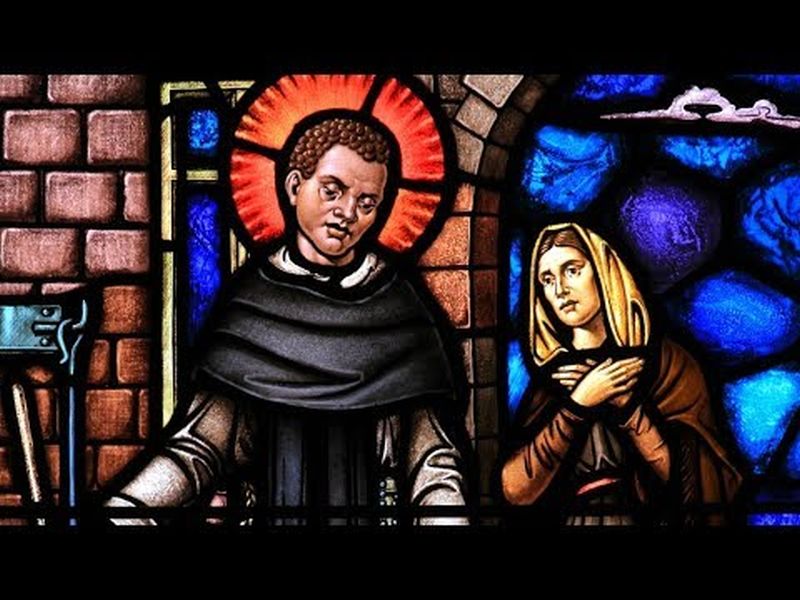On November 3, the Catholic Church celebrates the memory of two outstanding men, both worthy of emulation: Martin de Porres and Rupert Mayer.
Centuries and continents separated them. Martin was born in 1579 in Lima, Peru, South America while Rupert was born in Stuttgart, Germany, Europe.
Martin was Dominican and black, Rupert was Jesuit and white. Both died while in their sixties. Their deteriorating health, which led to their fairly untimely deaths, was clearly due to their high degree of commitment to suffering humanity.
Martin gave his life for the poor and the marginalized, the excluded and the exploited, the sub-alterns and the “scum” of the society of his times. Rupert accompanied the youth, ministered to the migrants and the unemployed. Above all, he took a visible and vocal stand against Hitler and the Nazi regime. They both shared the same vision: a more humane, just, free, equitable, dignified and fraternal society.
Martin de Porres was the illegitimate son of a Panamanian mother (a freed slave) and a Spanish father (apparently a nobleman). Having inherited the dark color of his mother (who was possibly a black African or native American descent), he, his mother and younger sister were abandoned by his father. His childhood therefore was in stark poverty. After spending two years in primary school, Martin was placed with a barber/surgeon where he would learn to cut hair and the medical arts. Martin, who spent long hours in prayer, asked the Dominicans of Holy Rosary Priory in Lima to accept him as a volunteer who performed the most menial tasks in the monastery.
Rupert, on the other hand, was born into a well-to-do family of Stuttgart, Germany. He joined the Society of Jesus as a diocesan priest in 1900. The Spiritual Exercises of St. Ignatius Loyola influenced him greatly. After much prayer and discernment, he wrote, “Now I know my purpose, and the next step is to translate my conviction into action and to put all possible effort into educating myself for my calling.”
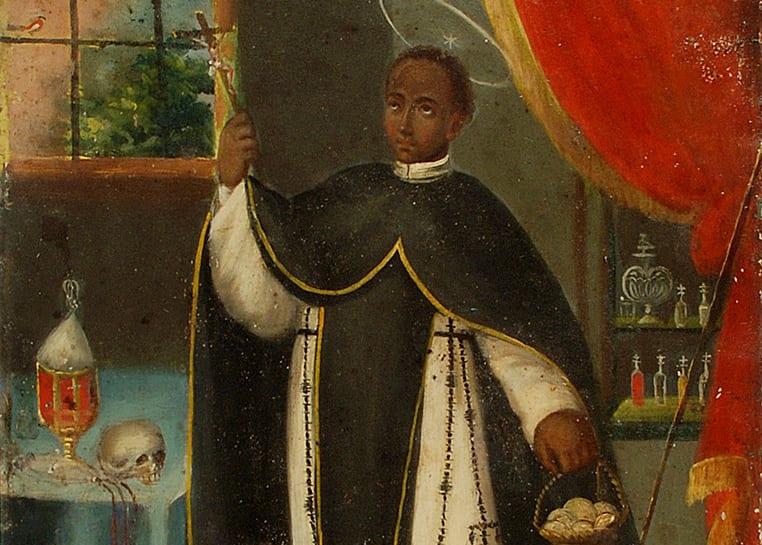
Martin became a Dominican lay brother at the age of 24 in 1603. Ten years later, after he had been presented with the religious habit of a lay brother, Martin was assigned to the infirmary where he would remain in charge until his death. He became known for encompassing the virtues needed to carefully and patiently care for the sick, even in the most difficult situations. Some of his own community members called him horrible names and mocked him for being illegitimate and a descendant of slaves. Martin, however, was praised by others for his unconditional care of all people, regardless of race or wealth. He took care of all, but particularly of the African slaves. Martin didn’t care if the person was diseased or dirty, he would welcome them into his own home.
Rupert was a Jesuit par excellence, deeply embedded in the Jesuit way of proceeding and totally committed to the responsibilities entrusted to him. He suffered a great deal, but he never complained about the pain he went through. He was a brilliant speaker and a prolific writer, wedded to the pursuit of justice and truth. He used both the pulpit (and public fora) and the pen, to speak truth to power. He minced no words when it came to show that he had the courage of his convictions. He feared no one – only God!
Martin de Porres was very devoted to the Blessed Eucharist. His life reflected his great love for God and all of God’s gifts. He also founded an orphanage for abandoned children and slaves and is known for raising dowry for young girls in short amounts of time. For the youth of Lima, he established a school. Martin is often referred to as the “Saint of (with) the broom.” He often challenged his brothers on their racist prejudices. In one story, Martin came upon a group of Indians sweeping the floor under the watchful eye of one of the Dominican brothers. When told that they were cleaning to repay a meal they had received, Martin pointed out that the brother had fed some white people the previous day without forcing them to clean. After Martin’s firm but gentle challenge, the brother took up the broom himself. Martin frequently insisted on performing such hard and menial tasks as caring for the Order’s horses in the evenings, even when informed that servants were available for these chores. He would argue that the servants were tired from their day’s work while he, Martin, had done very little.
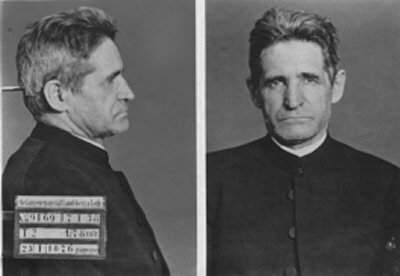
Father Rupert Mayer was an extraordinarily generous priest who through his limitless work and love for people was able to find Christ in each person. Mayer’s warmth, understanding and unconditional self-giving led each person he met to experience the love of Christ. He received his strength from the Lord. He was a perfect example of “taking up your cross,” never slowing down, never hesitating to do the will of God. Long before the “Universal Declaration of Human Rights” document was promulgated, Rupert Mayer was passionate about the rights of all, particularly when the Nazi regime denied the ordinary people freedom of speech and freedom of religion/belief. In 1923, he accepted an invitation to address a fledgling group of national socialists on the theme “Can a Catholic be a national socialist?” He accepted the invitation as a challenge totally prepared to go into a den of lions. Those who invited him felt that they had an unsuspecting “victim” to be mauled, so when he stood up to address them, the huge crowd gave him a tremendous applause. Mayer began “I am afraid, gentlemen that your applause has come a little too soon. My answer to your question can only be a negative one: NO! A Catholic cannot be a Nazi!” The early “applause” of the crowd immediately turned to “boos” but Rupert Mayer had made his point. He was convinced that a disciple of Jesus could not subscribe to the Nazi ideology and had to stand up to every form of hate, discrimination and violence.
Martin de Porres was beatified by Pope Gregory XVI on October 29, 1837, and canonized by Pope John XXIII on May 6, 1962. In his homily during the canonization, Pope John XXIII said, “Martin loved men because he honestly looked on them as God’s children and as his own brothers and sisters. Such was his humility that he loved them even more than himself and considered them to be better and more righteous than he was. He did not blame others for their shortcomings. Certain that he deserved more severe punishment for his sins than others did, he would overlook their worst offenses. He was tireless in his efforts to reform the criminal, and he would sit up with the sick to bring them comfort. For the poor he would provide food, clothing and medicine. He did all he could to care for poor farmhands, blacks and mulattoes who were looked down upon as slaves, the dregs of society in their time. Common people responded by calling him ‘Martin the charitable.’”
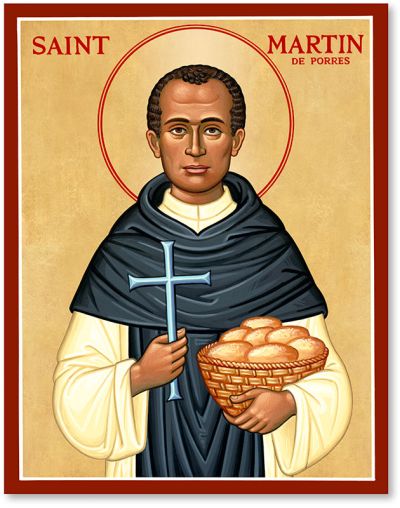
Rupert Mayer, who was beatified by Pope (now Saint) John Paul II on May 3, 1987, was a strong, blunt and vocal critic of the Nazi regime. The Nazis did not take his criticism lightly and he was imprisoned from 1937 till 1945, either in a concentration camp or in exile outside Munich. The solitary confinement did not break his spirit. It was an occasion to deepen his spirituality. This is evident in a letter which he wrote to his mother: “In these last weeks in solitude I believe I have come into far closer contact with God Almighty in my own self and in the same measure I have become more detached and withdrawn from earthly things. So, I feel not the least worry or anxiety about my future. I place all that in God’s good hands. In myself I am completely contended and at peace.” Though Mayer suffered greatly at the hands of the Nazi regime, he did not compromise. For him, soft-pedalling the brutality of the Nazis or even in engaging with them with diplomatic niceties was abhorrent to anyone who believed and lived the Gospel of Jesus. His resolute courage also earned him the admiration of his detractors; so much so that they were afraid to allow him to die a martyr’s death in a concentration camp and sent him to live in exile in a monastery at the of his life.
The realities which confronted the ordinary people of South America and Europe during the times of Martin de Porres and Rupert Mayer, are blatantly prevalent in India today. Vast sections of India’s population, particularly the minorities, the Adivasis, the Dalits and other vulnerable communities, are at the mercy of a fascist regime. Freedom of speech and freedom of religion are being throttled. Those who take a stand have false cases foisted on them. They are hounded and harassed, sent to prison and even killed. The economy is in a shamble, poverty and unemployment are on the rise, migrants are at the mercy of others, a corrupt few amass huge wealth. Lies and false promises are dished out today, in exactly the same manner, as done earlier by the European colonialists and the Nazi regime.
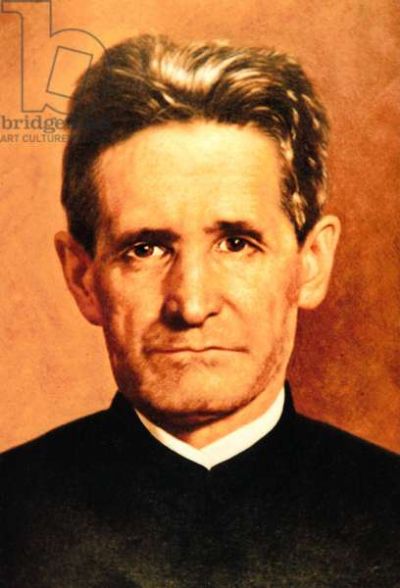
In a world, torn asunder with hate and violence, discrimination and divisiveness, exclusion and exploitation, class and caste, rites and rituals, we need the likes of St. Martin de Porres, the patron Saint of Social Justice, and Blessed Rupert Mayer, the Apostle of Munich and certainly the patron of dissenters and resisters, writers and speakers. Both Martin and Rupert were rooted in the person and message of Jesus and were not afraid to take on the racism and fascism of their times. They believed in and lived the gospel without compromise!
The unwavering courage and whole-hearted commitment of both these great men, is radiated in the prayer which Mayer wrote in 1941:
“Lord, as you will, so let it be for me; And as you will, so will I walk that road;
Help me only to know your will!
Lord whenever you will, then is the time; And whenever you will, then I am ready,
today and always.
Lord, whatever you will, that I accept, and whatever you will, is gain for me;
Enough, that I belong to you.
Lord, because you will it, it is good; And because you will it, I have courage,
My heart rests safely in your hands!”
It is certainly God’s hand that both Martin de Porres and Rupert Mayer are celebrated by the Church on November 3 every year. We are called to emulate them today.
Father Cedric Prakash SJ is a human rights, reconciliation and peace activist and writer. You can reach him at [email protected]

